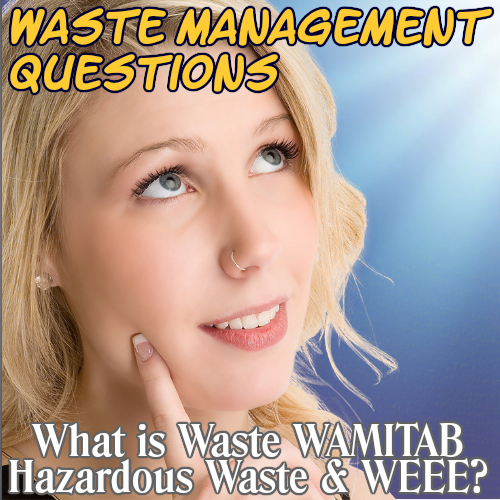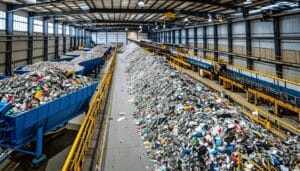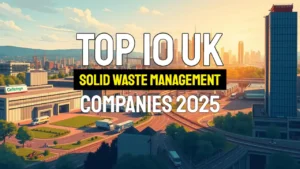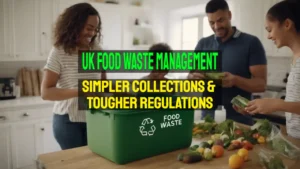 Q: What is waste?
Q: What is waste?
A: Waste is defined for the propose of the UK Waste Management Regulations as:
- Any substance or object that you discard, intend to discard, or are required to discard is waste and as such is subject to a number of regulatory requirements.
- Even if material is sent for recycling or undergoes treatment in-house, it can still be waste. [The term ‘discard' has a special meaning in the Waste Management Regs.]
- Whether or not a particular material is waste is for the person producing it to decide.
Q: What are hazards?
A: A hazard is something with potential to cause harm.
Q: Who are WAMITAB?
WAMITAB is the organisation responsible for the scheme for demonstrating competence for managers of operational facilities. All UK Waste Management facilities must be operated by such a “technically competent person”.
This is based on firstly achieving a vocational qualification and then being awarded the Certificate of Technical Competence (COTC) by WAMITAB. The scheme was implemented within the framework of the Waste Management Licensing Regulations 1994, whereby managers of those facilities covered by a waste management licence need to hold a Certificate of Technical Competence (COTC), unless a specific exemption applies.
In addition to the above, WAMITAB has recently developed occupational standards and vocational qualifications for waste management operatives involved with waste collection, landfill and treatment.
Q: What is the background to the recent changes in UK hazardous waste disposal?
A: The Landfill Directive, introduced in 2002, banned certain wastes from landfill, and reclassified landfill sites into three categories of:
- inert;
- hazardous; or
- non hazardous waste.
From July 2004, a further requirement of the legislation was introduced banning co-disposal – preventing hazardous and non-hazardous waste being disposed together and at the same site.
From July 2005, hazardous waste will only be acceptable at appropriate landfill sites, once it has been pre-treated and is acceptable under the terms of another part of the Landfill Directive: the Waste Acceptance Criteria.
Q: What is the EU Hazardous Waste Directive
A: The Hazardous Waste Directive (HWD) aims to provide a precise and uniform definition of ‘hazardous waste’ to apply across the European Union, to reduce confusion and streamline the current systems. This is in the process of being implemented in the UK and will redefine what hazardous waste is.
Many items that weren't previously defined as hazardous now will be. This means that companies and organizations who previously never had their rubbish/waste classed as hazardous, now will.
Q: What is the result of the Hazardous Waste Directive, and the Waste Electrical and Electronic Equipment (WEEE) Directive?
A: The implementation of the Waste Electrical and Electronic Equipment Directive (WEEE), and the Restriction of Hazardous Substances Directive, means that companies who manufacture and supply electrical and electronic equipment are in principle ultimately responsible for disposing of it once it breaks down.
For example, in principle, whoever buys a Television or Computer, is entitled to take it back to the shop from which he bought it to have it disposed of when it breaks down and can’t be fixed, or reaches the end of its life.
Revolutionizing Waste Recovery: Latest Separation And Sorting Innovations
Waste recovery is changing fast, thanks to new separation and sorting technology. This tech helps us sort trash better, so we can recycle more things. For example, Stadler has built a big plant in Spain for VAERSA that makes recycling easier and smarter. Keson is finding new ways to deal with old tyres, helping both […]
Top 10 UK Solid Waste Management Companies 2025
The UK waste management sector stands as a vital industry worth billions of pounds. The top UK Solid Waste Management Companies are the leading waste management firms in Britain. These companies handle millions of tonnes of rubbish each year. The industry has transformed significantly over the past two decades through strategic mergers and environmental innovations. […]
Ramp Method of Waste Disposal – Landfill Guide & Techniques
The ramp method optimizes landfill operations by creating an inclined surface, allowing efficient waste compaction and daily cover application. Unlike traditional methods, it requires minimal excavation, reducing costs and extending landfill lifespan. Proper implementation and equipment maintenance are key to effective ramp method performance in various terrains…
The Future of UK Food Waste Management – Simpler Collections and Tougher Regulation
The future of UK food waste management will be a big push toward higher recycling rates through simpler collection and far greater consistency across the nations, helping citizens understand how to be green and recycle more organic waste. As the UK continues to advance its environmental goals, recently announced government policies aimed at simplifying waste […]









